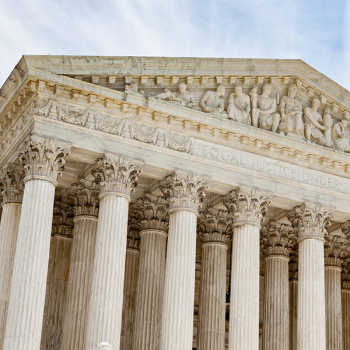of Experience Helping
Clients With IRS, Colorado,
and Local Tax Controversy
and Litigation Issues.


Since earning a Master of Laws degree in Taxation (LL.M.) in 1993, David A. Sprecace has continually provided high-quality tax law services in Denver, Colorado Springs, Colorado’s mountain communities, and on the western slope. His practice consists primarily of I.R.S., Colorado, and Municipal tax controversy and litigation, meaning he represents individual and business taxpayers when their tax returns are selected for audit, during the audit process, and in the administrative forum once the audit concludes, if the taxpayers disagrees with the examiner’s findings. If the tax issues are still unresolved after the administrative forum, he represents the taxpayer in federal or Colorado court. If a taxpayer has filed tax returns and owes tax, he helps the taxpayer navigate the difficult procedures of tax collection, and protects the taxpayer from overreach of the I.R.S., Colorado Department of Revenue, and Municipal taxing authorities.
Mr. Sprecace’s professional experience includes tax disputes in the areas of I.R.S., Colorado, and local tax audits and appeals, employment tax, the Trust Fund Recovery Penalty, tax liens, tax levies, tax return audits, offers in compromise, the innocent spouse provisions, and state and local sales, use, and lodger’s tax. Over the past 30 years, he has represented hundreds of clients, including lawyers, physicians, dentists, other professionals, caterers, hotel owners, and many other small and medium-sized business owners and businesses (up to $26 Million gross annual revenue) in tax audits and in the United States Tax Court, the United States District Court for Colorado, the Bankruptcy Court for the District of Colorado, and Colorado District and Appellate courts. He has served as an expert witness in the areas of tax matters in divorce proceedings, and legal fees incurred for tax issues in a divorce proceeding. With clients from Alaska to Florida and Hawaii to Connecticut, David A. Sprecace, P.C. strives to offer personal service and excellent results, quickly and cost-efficiently, for your tax and business litigation needs.
Maybe you or your business has received one of those letters requesting you to call an IRS Revenue Agent within the next 10 days to set up an appointment to “examine” your tax return. Or maybe you’ve received a letter requesting more information because your tax return is incomplete. Or maybe the IRS received information from a third-party reporting agency that doesn’t match what you have on your tax return.
Detailed examinations or audits can take weeks or months to complete, and front-line Revenue Agents are not inclined to accept excuses or the lack of substantiation. They are inclined and instructed to go by the book. Regardless, David A. Sprecace, P.C. can help with organizing your deductible items and substantiation, with ensuring that income-side problem are minimized as much as possible, and with ensuring that your rights are preserved through a difficult process.
After the Revenue Agent writes a final “Revenue Agent Report”, you have either 30 days or 60 days (depending on the type of tax return examination) within which to file a Protest to the IRS Office of Appeals. After that time expires, the next course of action is usually a Petition in the United States Tax Court, so the deadline for filing a Protest should be taken seriously.
A properly-prepared Protest not only sets forth the items of disagreement with the Revenue Agent, but also contains a detailed analysis of the legal basis for the taxpayer’s arguments disputing the findings of the Revenue Agent. Appeals Officers are frequently trained in tax law, and have access to IRS lawyers who can help them sift through the nuances of tax law, in order to decide whether the taxpayer’s arguments have strength, or any merit at all. It is very important to have an experienced tax lawyer on your side through this process.
Some taxpayers are completely unaware that they owe tax, and yet find that a Notice of Federal Tax Lien has been filed against their property and rights to property. This can have devastating effects for those trying to refinance a mortgage or purchase a home or automobile.
The IRS has the right and the ability to file tax liens if the tax liability is not paid off within 10 days of demand. You will have the right and ability to dispute the filing of a tax lien within 30 days of receiving the notice, but by then the damage is done. In other words, the IRS files the lien, then you can dispute it. The lien may show up on credit reports, though. Similarly, the IRS has the right and the ability to levy (garnish) bank accounts and wages, 30 days after sending a Collection Due Process demand.
The State of Colorado and each Home Rule city in Colorado has the authority to impose and collect Sales and/or Use tax on transactions involving tangible property and goods. These are just the most-common types of state and local tax, though. There are many more, including tax in various districts like the Regional Transportation District, the business personal property tax, the real property tax, the inheritance tax, the lodger’s tax, and the occupational privilege tax, to name a few. Sales tax and Use tax returns are probably the most-common types of returns examined because cities rely most on these taxes to fund city services.
When cases are not resolved at the IRS Office of Appeals, frequently the only further course of action for taxpayers is to file a Petition in the U.S. Tax Court, or a Complaint in the U.S. Court of Federal Claims, or U.S. District Court. These actions are expensive for taxpayers, since lawyers must spend scores or hundreds of hours gathering evidence, taking depositions, and preparing for trial. Further, taxpayers must spend significant amounts of time over the course of nine to twelve months responding to discovery requests. Make no mistake: federal lawsuits are expensive, time-consuming, and “taxing” on all involved—taxpayers and attorneys alike.
When all other avenues to dispute a CDOR audit determination or collection action, tax litigation in the Colorado District Court is the last resort. Frequently, too, the taxpayer must either pay the tax or post a bond for the tax, before filing suit. As with other litigation, it is time-consuming and expensive to go to Colorado District Court.



IRS’s Large Business & International Division To Increase Focus On Partnerships November 17, 2022 David A. Sprecace, P.C. The IRS’s LB&I Division will be increasing its audit focus on partnerships, division Acting Commissioner Holly Paz said. “Over the last...
Fail-To-File Penalties Temporarily Waived August 25, 2022 David A. Sprecace, P.C. In Notice 2022-36 issued August 24, 2022, the IRS publicized that a broad range of tax and information returns for the 2019 and 2020 tax years will...
Treasury Secretary Yellen And “High-End Compliance” August 15, 2022 David A. Sprecace, P.C. There is so much misinformation floating around. Yesterday, August 14, 2022, a Congressman from South Dakota said on Meet the Press that his...
Dave has ridden to our rescue on many occasions. It’s not that I try to get in trouble but Dave is always there to bail me out. Dave went toe-to-toe with the IRS over a several year legal battle. Nothing like having a nasty person from the IRS on the other end...
My business partner and I hired Dave to represent us with an IRS tax audit of our company and individual tax returns. There were other family members and other businesses involved, and the IRS initially wanted more than $120,000.00 of tax, penalty, and...
I called Dave to help me file several years of income tax returns. After the returns were filed, Dave filed an Offer in Compromise to get rid of the old taxes. The IRS accepted a small fraction of the original amount. With a fresh start, I can get back to...
When I needed to buy out my business partner, Dave told me of the possible pitfalls with the Operating Agreement, walked me through the entire process, helped me value the company, and make an offer. I was able to keep my company, at a very fair buyout price.
